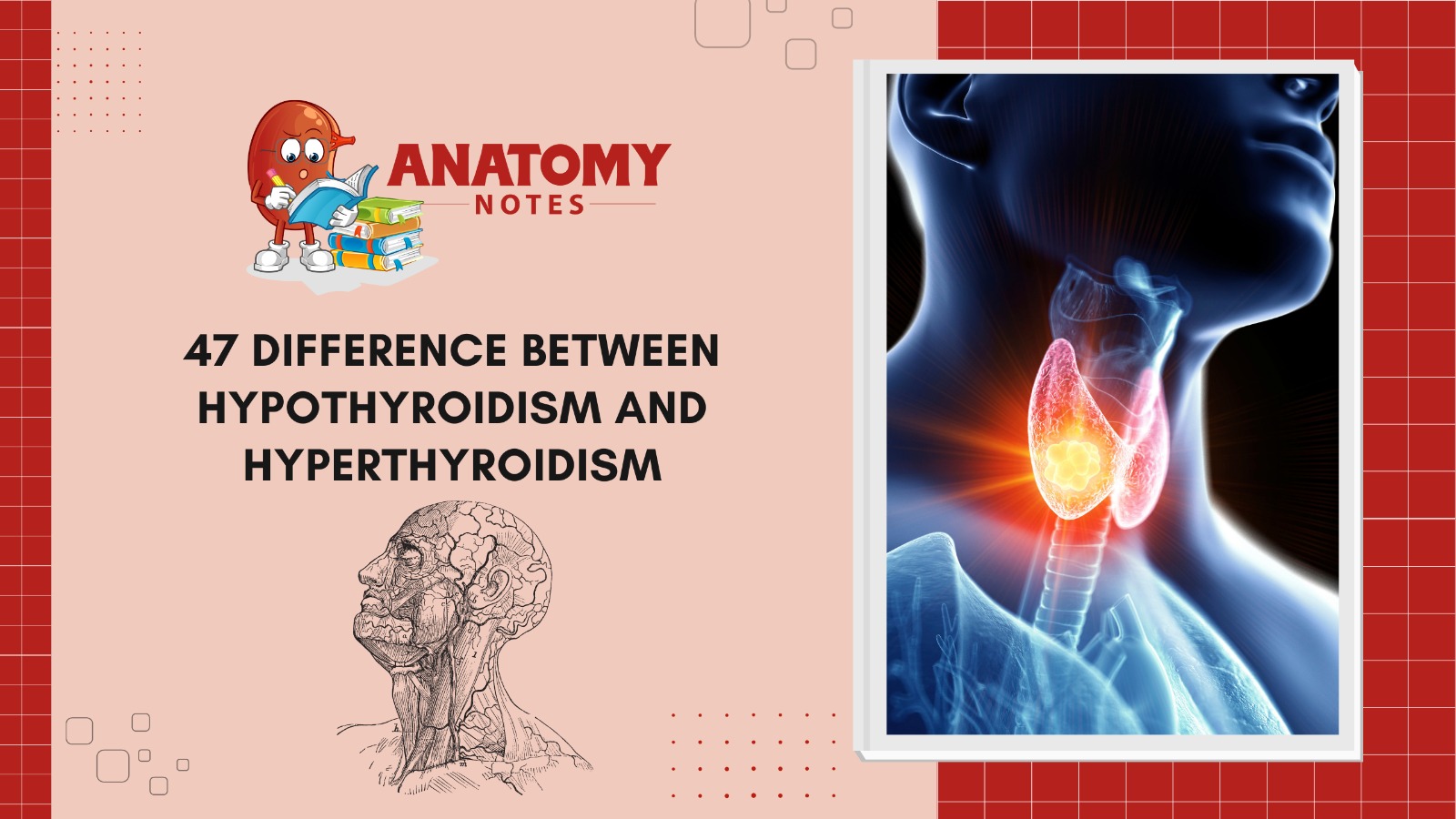Hypothyroidism and hyperthyroidism are thyroid disorders. Changes in thyroid hormone production affect physiology and metabolism differently. Hypothyroidism, or “underactive thyroid,” occurs when the thyroid gland doesn’t produce enough T4 and T3. Thyroid hormone deficiency slows metabolism, causing fatigue, weight gain, cold sensitivity, constipation, dry skin, and depression. In Hashimoto’s thyroiditis, the immune system assaults the thyroid gland , Causing hypothyroidism. It can also be caused by medications or iodine deficiency.Too many thyroid chemicals cause hyperthyroidism or overworked thyroid. Increased hormone synthesis speeds up metabolism, causing weight loss, a quick heartbeat, heat resistance, uneasiness, anxiety, and difficulties sleeping. Grave’s disease, an autoimmune condition, causes hyperthyroidism by telling the thyroid gland to generate too many hormones. Thyroid tumors or inflammation may also cause it.
The two illnesses have distinct symptoms, causes, and treatments. Hypothyroidism causes fatigue and weight gain, whereas hyperthyroidism causes energy and weight reduction. TFTs that monitor TSH, T3, and T4 levels and imaging assist doctors diagnose. Treatment regimens vary greatly. Synthetic thyroid hormone replacement therapy works successfully to normalize hormone levels in hypothyroidism. However, medications that block the thyroid from manufacturing hormones, radioactive iodine treatment to reduce the thyroid, or thyroid surgery can treat hyperthyroidism.
Hypothyroidism and hyperthyroidism are thyroid illnesses caused by hormone imbalances. A poorly functioning thyroid causes hypothyroidism. This slows metabolism and produces other symptoms. Hyperthyroidism causes an overactive thyroid. It accelerates metabolism and produces other symptoms. Thyroid function tests must be accurate for therapy to work. Healthcare staff must understand these variances to treat each patient properly.
Also Read: The Human Body Systems: Overview, functions and anatomy
|
S.No. |
Aspect |
Hypothyroidism |
Hyperthyroidism |
|
1 |
Thyroid Function |
Insufficient thyroid hormone production |
Excessive thyroid hormone production |
|
2 |
Metabolism |
Slowed metabolism |
Increased metabolism |
|
3 |
Energy Levels |
Decreased energy levels |
Increased energy levels |
|
4 |
Weight Changes |
Weight gain |
Weight loss |
|
5 |
Heart Rate |
Slower heart rate |
Elevated heart rate |
|
6 |
Blood Pressure |
May be elevated |
May be elevated |
|
7 |
Body Temperature |
Lower body temperature |
Elevated body temperature |
|
8 |
Fatigue |
Profound fatigue and tiredness |
Restlessness and increased energy |
|
9 |
Muscle Weakness |
Muscle weakness and aches |
Muscle weakness and tremors |
|
10 |
Mood Changes |
Depression, lethargy |
Anxiety, irritability |
|
11 |
Hair and Skin |
Dry skin, hair loss |
Moist, warm skin, excessive sweating |
|
12 |
Nail Changes |
Brittle and thin nails |
Nails may become soft and brittle |
|
13 |
Cognitive Function |
Impaired memory and concentration |
Restlessness, difficulty focusing |
|
14 |
Menstrual Irregularities |
Heavier or irregular periods |
Light or absent periods |
|
15 |
Fertility Issues |
May affect fertility |
Fertility may be affected |
|
16 |
Goiter |
May lead to goiter (enlarged thyroid) |
Goiter may develop or worsen |
|
17 |
Voice Changes |
Hoarse voice |
Thinner voice, or higher-pitched |
|
18 |
Cholesterol Levels |
Elevated cholesterol levels |
|
|
19 |
Intolerance to Cold |
Feeling cold, intolerance to cold environments |
Increased sensitivity to heat |
|
20 |
Intolerance to Heat |
Tolerance to heat |
Intolerance to heat |
|
21 |
Bowel Habits |
Constipation |
Diarrhea, frequent bowel movements |
|
22 |
Sleep Patterns |
Excessive sleepiness |
Difficulty falling asleep, restlessness |
|
23 |
Heart Palpitations |
Bradycardia (slow heart rate) |
Palpitations, rapid heartbeat |
|
24 |
Men’s Health |
Low libido, erectile dysfunction (ED) |
Increased libido, possible ED |
|
25 |
Women’s Health |
Irregular or heavy periods |
Light or absent periods, early menopause |
|
26 |
Eye Changes |
Puffy eyes, dryness |
Bulging eyes (exophthalmos), irritation |
|
27 |
Skin Changes |
Pale, cool, dry skin |
Warm, moist skin |
|
28 |
GI Motility |
Slowed gastrointestinal motility |
Increased gastrointestinal motility |
|
29 |
Bone Health |
Increased risk of osteoporosis |
Potential for decreased bone density |
|
30 |
Treatment Approach |
Hormone replacement therapy |
Medications to reduce thyroid hormone |
|
31 |
Medication |
Methimazole, propylthiouracil (anti-thyroid) |
|
|
32 |
Common Causes |
Hashimoto’s thyroiditis, iodine deficiency |
Graves’ disease, thyroid nodules |
|
33 |
Risk Factors |
Family history, age |
Family history, gender (more common in women) |
|
34 |
Complications |
Myxedema coma (severe), heart problems |
Thyroid storm (severe), heart problems |
|
35 |
Onset |
Can develop over years |
Can develop suddenly |
|
36 |
Autoimmune Component |
Common in Hashimoto’s thyroiditis |
Common in Graves’ disease |
|
37 |
Hormone Testing |
Low T4, elevated TSH levels |
High T4 and T3, low TSH levels |
|
38 |
Imaging Tests |
Thyroid ultrasound, radioactive iodine uptake |
Thyroid scan, radioactive iodine uptake |
|
39 |
Emotional Impact |
Depressed mood, fatigue |
Anxiety, emotional instability |
|
40 |
Medication Adjustments |
Regular monitoring and dose adjustments |
Regular monitoring and dose adjustments |
|
41 |
Pregnancy Management |
Requires careful monitoring and management |
Requires careful monitoring and management |
|
42 |
Hair Changes |
Dry, brittle hair |
Increased hair loss, fine hair |
|
43 |
Eye Involvement |
May cause puffiness |
Can cause bulging eyes (Graves’ ophthalmopathy) |
|
44 |
Dermatological Changes |
Dry, coarse skin |
Smooth, warm, moist skin |
|
45 |
Thyroid Storm |
Rare but life-threatening emergency |
Life-threatening emergency condition |
|
46 |
Bone Health Risks |
Increased risk of fractures |
Potential for decreased bone density |
|
47 |
Impact on Mental Health |
May lead to depression and cognitive issues |
Can cause anxiety, irritability, and mood swings |
Also Read: Introduction to the Endocrine System – Its Structure & Function
Frequently Asked Questions (FAQS)
Q.1 What is hypothyroidism and what causes it?
Hypothyroidism occurs when the thyroid gland produces too little T4 and T3. Autoimmune illnesses such as Hashimoto’s thyroiditis, iodine shortage, medicines, and thyroid surgery can cause this.
Q.2 What are common hyperthyroidism symptoms?
An overactive thyroid gland produces too many thyroid hormones in hyperthyroidism. Weight loss, high heart rate, heat sensitivity, anxiety, tremors, and insomnia are common. Grave’s disease, an autoimmune disorder, can cause bulging eyes and neck edema.
Q.3 How are hypothyroidism and hyperthyroidism diagnosed?
Both illnesses are diagnosed by clinical and laboratory investigations. TFTs monitor TSH, T4, and T3 to evaluate thyroid overactivity. Ultrasound and radioactive iodine scans can evaluate the thyroid gland’s shape and function.
Q.4 What treatments are available for hypothyroidism and hyperthyroidism?
Synthetic thyroid hormone replacement treats hypothyroidism. Levothyroxine is used to normalize thyroid hormone levels. Anti-thyroid medicines, radioactive iodine therapy, or thyroid surgery can treat hyperthyroidism.
Q.5 Can thyroid diseases be prevented?
It’s not always feasible to prevent thyroid diseases, but you can support thyroid health. Iodine is essential for thyroid hormone synthesis, thus diet and supplementation are crucial. Avoiding radiation and living a healthy lifestyle, including regular exercise and a balanced diet, may also help thyroid health. Regular checkups and early discovery can help control thyroid diseases in families.




